Իրազեկում
Famous whistleblowers
1. Sherron Watkins (Enron scandal, USA, 2000s)
Sherron Watkins is a former Enron employee who played a significant role in exposing the corporate fraud and accounting scandals at Enron Corporation, one of the largest corporate scandals in American history.
Enron was an energy trading and utilities company that declared bankruptcy in 2001, resul...
Sherron Watkins is a former Enron employee who played a significant role in exposing the corporate fraud and accounting scandals at Enron Corporation, one of the largest corporate scandals in American history.

Enron was an energy trading and utilities company that declared bankruptcy in 2001, resulting in significant financial losses for investors and employees. Watkins was the Vice President of Corporate Development at Enron and worked in the company's finance department.
In August 2001, she decided to write an anonymous memo ("Watkins memo"), summing up the financial problems facing Enron and dropped the memo into an Enron communications box. A few days later, Watkins went to Human Resources (HR) and identified herself as the memo’s author. Watkins noted that some critics keep referring to her as an “anonymous whistleblower”․ Watkins was not anonymous long, HR facilitated a meeting with Kenneth Lay, founder, CEO and Chairman of Enron, and Watkins presented thefinancial fraud directly to Lay. Lay promised to look into the evidence, but after some time Watkins realized that the company's CEO and president, Kenneth Lay, was also a direct participant in these frauds․
 In October 2001, The Wall Street Journal began investigative articles on Enron, and the SEC started a preliminary investigation. Watkins advised she was not the only individual who knew about the fraud, but in a company with 8,000 employees, she was the only one to write a memo alerting the fraud.
In October 2001, The Wall Street Journal began investigative articles on Enron, and the SEC started a preliminary investigation. Watkins advised she was not the only individual who knew about the fraud, but in a company with 8,000 employees, she was the only one to write a memo alerting the fraud.After a while, Enron filed for bankruptcy, which was the largest bankruptcy in U.S. history at the time.
Sherron Watkins was praised by society for her courage in coming forward and whistleblowing on Enron's fraudulent activities. Her actions highlighted the importance of corporate governance, financial transparency, and the need for reforms in corporate oversight. She testified before Congress and became an advocate for corporate ethics and accountability. Her whistleblowing contributed to the subsequent passage of the Sarbanes-Oxley Act, which aimed to enhance corporate governance and accountability.
Sherron Watkins once said. “Whistleblowers are now presented as positive and courageous, and blowing the whistle is getting a better reputation.”
2. Coleen Rowley (FBI scandal, USA, 2000s)
Coleen Rowley is a former FBI (Federal Bureau of Investigation) agent who gained national attention as a whistleblower in the aftermath of the September 11, 2001, terrorist attacks in the United States.
Rowley worked for the FBI for over 20 years. In 2002, she became known for writing a memo to the...
Coleen Rowley is a former FBI (Federal Bureau of Investigation) agent who gained national attention as a whistleblower in the aftermath of the September 11, 2001, terrorist attacks in the United States.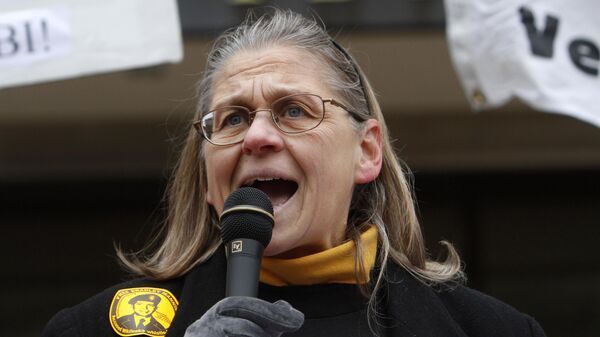

Rowley worked for the FBI for over 20 years. In 2002, she became known for writing a memo to then-FBI Director Robert Mueller and other high-ranking officials within the FBI.
In May 2002, Coleen Rowley wrote a 13-page letter to FBI Director Robert Mueller in which she raised concerns about how the FBI had handled certain information in its possession before the attacks. Among other things, Rowley discussed the FBI’s investigation of Zacarias Moussaoui, a French citizen who had been arrested in Minneapolis on August 16, 2001. The Minneapolis FBI Field Office had received a telephone call from a representative of a flight school reporting suspicions about Moussaoui, who was taking flying lessons at the school near Minneapolis. Acting on this information, FBI and Immigration and Naturalization Service (INS) agents in Minneapolis discovered Moussaoui’s possible connections to terrorism and violation of his immigration status. As a result, on August 16, 2001, Moussaoui was taken into custody on immigration charges.
 Rowley criticized the FBI Headquarters managers who were involved with the Moussaoui investigation prior to September 11. FBI Director Mueller subsequently referred Rowley’s letter to the Inspector General and asked the Office of the Inspector General (OIG) to review the FBI’s handling of the Moussaoui investigation. The director also requests to review the development of the program that may be related in some way to the attacks of September 11, 2001.
Rowley criticized the FBI Headquarters managers who were involved with the Moussaoui investigation prior to September 11. FBI Director Mueller subsequently referred Rowley’s letter to the Inspector General and asked the Office of the Inspector General (OIG) to review the FBI’s handling of the Moussaoui investigation. The director also requests to review the development of the program that may be related in some way to the attacks of September 11, 2001.Her whistleblowing efforts led to her being named Time magazine's Person of the Year in 2002.
Rowley's actions played a vital role in the push for reforms in the U.S. intelligence community, including the implementation of the USA PATRIOT Act and the creation of the Department of Homeland Security. Her story remains significant in discussions about whistleblowing, government accountability, and national security in the post-9/11 era.
Coleen Rowley once said. "Sometimes people don't want to hear the truth because they don't want their illusions destroyed."
3. LuxLeaks Whistleblowers (LuxLeaks scandal, Luxembourg, 2014)
LuxLeaks is the name of a financial scandal revealed in November 2014 by a journalistic investigation conducted by the International Consortium of Investigative Journalists. It is based on confidential information about Luxembourg's tax rulings set up by PricewaterhouseCoopers from 2002 to 2010 to t...
LuxLeaks is the name of a financial scandal revealed in November 2014 by a journalistic investigation conducted by the International Consortium of Investigative Journalists. It is based on confidential information about Luxembourg's tax rulings set up by PricewaterhouseCoopers from 2002 to 2010 to the benefits of its clients.
The LuxLeaks whistleblowers were a group of individuals who exposed information about tax avoidance and evasion by multinational corporations in Luxembourg. They are Antoine Deltour, Raphaël Halet, and Edouard Perrin.
Antoine Deltour was a French-born employee of PricewaterhouseCoopers (PwC) in Luxembourg. He worked as an auditor and discovered a vast number of tax rulings and agreements that exposed multinational corporations' preferential tax arrangements with the Luxembourg government. These agreements allowed these companies to drastically reduce their tax liabilities. Deltour was troubled by what he found and decided to expose the information. Deltour copied thousands of confidential documents from PwC, including tax rulings and financial data, and later shared them with journalists. His actions triggered the LuxLeaks scandal, leading to widespread public outrage and extensive media coverage. Deltour faced legal consequences for his actions but became a symbol of whistleblower protection and tax transparency, receiving support and recognition from various organizations and individuals. In 2015, he was awarded the European Citizen's Prize by the European Parliament.
Raphaël Halet, another former PwC employee, also played a significant role in exposing the LuxLeaks scandal by providing additional documents to journalists, contributing to the investigation.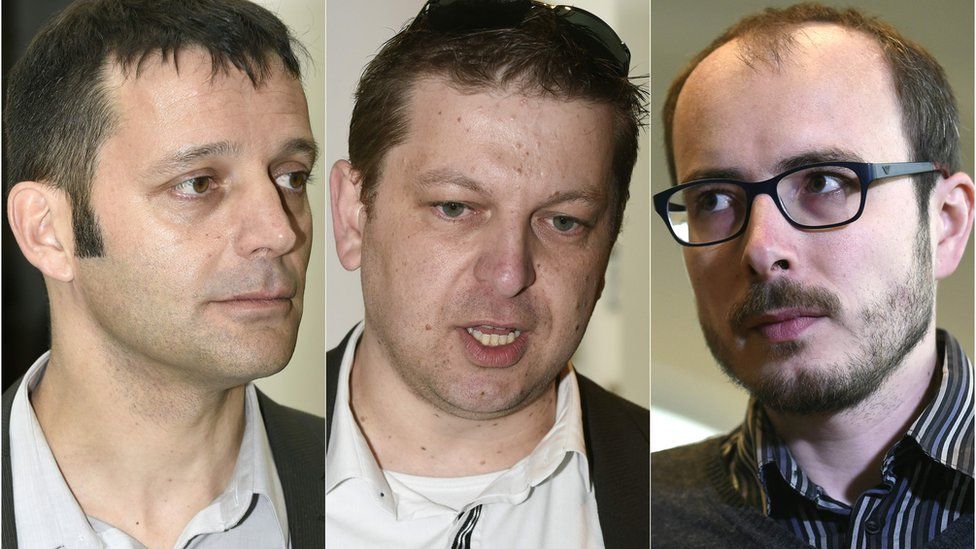

Edouard Perrin is a French investigative journalist who played a vital role in uncovering and reporting on the LuxLeaks scandal. He received the leaked documents from Deltour and Halet and collaborated with other journalists and media organizations to analyze and publish the information. Perrin also faced legal challenges for his involvement in the publication of the LuxLeaks documents but his investigative journalism was defended by various media organizations and advocacy groups.
 The LuxLeaks whistleblowers faced legal battles for their actions, but their disclosures had a lasting impact on the debate surrounding tax fairness, corporate responsibility, and the need for transparency in global tax systems.
The LuxLeaks whistleblowers faced legal battles for their actions, but their disclosures had a lasting impact on the debate surrounding tax fairness, corporate responsibility, and the need for transparency in global tax systems.Raphaël Halet said. "My motivation was really to expose what was happening behind the scenes and how tax rulings were being used to facilitate tax avoidance."
4. Edward Snowden ("Edward Snowden scandal", USA, 2013)
Edward Snowden is a former intelligence contractor who gained worldwide attent
ion in 2013 when he leaked classified information from the National Security Agency (NSA) to journalists, exposing widespread surveillance programs conducted by the NSA and
other intelligence agencies. Snow...
Edward Snowden is a former intelligence contractor who gained worldwide attent

ion in 2013 when he leaked classified information from the National Security Agency (NSA) to journalists, exposing widespread surveillance programs conducted by the NSA and
other intelligence agencies. Snowden's disclosures revealed the extent to which governments were collecting and monitoring digital communications of individuals and organizations around the world.
In 2009 Snowden joint the NSA․During this time, he began gathering information on a number of NSA activities—most notably, secret surveillance programs.
In May 2013 Snowden requested a medical leave of absence and flew to Hong Kong, where he conducted a series of interviews with journalists from the newspaper The Guardian. Footage filmed during that period was featured in the documentary Citizenfour (2014).
One of the top secrets among the NSA leaked by Snowden was the existence of PRISM, a data-mining program that reportedly gave the NSA, the Federal Bureau of Investigation, and the Government Communications Headquarters “direct access” to the servers of such Internet giants as Google, Facebook, Microsoft, and Apple.
Days after stories were initially published in The Guardian and The Washington Post without revealing the identity of their source, Snowden came forward, stating that he felt no need to hide because he had done nothing wrong. The U.S. charged Snowden with espionage on June 14, and Justice Department officials, including Attorney General Eric Holder, began negotiating with authorities in Hong Kong in an attempt to initiate extradition procedures. The Hong Kong government declined to act, and Snowden, with the assistance of the media organization WikiLeaks, flew to Moscow․Russian President Vladimir Putin confirmed that Snowden, whose passport had been revoked by the U.S., remained within the confines of the international transit zone of Moscow’s Sheremetyevo airport.
In August 2014, the Russian government awarded him a three-year residence permit and Snowden was granted permanent residency in 2020. In September 2022 Russian Pres. Vladimir Putin granted Snowden Russian citizenship.
Edward Snowden's whistleblowing fundamentally reshaped the discourse around surveillance, privacy, and government transparency․
Edward Snowden said. “Even if you're not doing anything wrong, you are being watched and recorded”.
5. Katharine Gun ("GCHQ leak" scandal, United Kingdom, 2003)
Katharine Gun is former translatorat the government intelligence agency, GCHQ, in Cheltenham and became known as a whistleblower in 2003.
In early 2003, during the lead-up to the Iraq War, she leaked a top-secret memo․ The memo outlined a plan by the U.S. National Security Agency (NSA) to intercept...
 Katharine Gun is former translatorat the government intelligence agency, GCHQ, in Cheltenham and became known as a whistleblower in 2003.
Katharine Gun is former translatorat the government intelligence agency, GCHQ, in Cheltenham and became known as a whistleblower in 2003.In early 2003, during the lead-up to the Iraq War, she leaked a top-secret memo․ The memo outlined a plan by the U.S. National Security Agency (NSA) to intercept communications of Security Council members in an attempt to influence their votes on a resolution regarding Iraq.
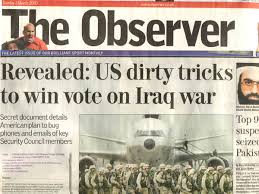 Katharine Gun was troubled by the implications of this plan and believed it to be a violation of international law and the principles of the UN Charter. In an act of conscience, she decided to leak the memo to prevent what she saw as an abuse of power and manipulation of intelligence for political purposes. The story was first reported by «The Observer» newspaper in March 2003, just before the Iraq War started. Just after the publishing, Gun was arrested and charged with breach of the Official Secrets Act.
Katharine Gun was troubled by the implications of this plan and believed it to be a violation of international law and the principles of the UN Charter. In an act of conscience, she decided to leak the memo to prevent what she saw as an abuse of power and manipulation of intelligence for political purposes. The story was first reported by «The Observer» newspaper in March 2003, just before the Iraq War started. Just after the publishing, Gun was arrested and charged with breach of the Official Secrets Act.Once Gun was asked why she had chosen to act as she had. “You work for the British government,” her interrogator said, with a sneer. “No,” Gun replied, steadily. “I work for the British people. I do not gather intelligence so the government can lie to the British people.”
The legal case against Gun was eventually dropped, after her lawyer, Ben Emmerson, threatened to use disclosure to put the legal basis of the war itself on trial.
Overall, Katharine Gun's whistleblowing had a lasting impact on governmental policies, and the broader conversation surrounding the Iraq War and the role of intelligence agencies in democratic societies.
Katharine Gun said. “Whatever your job is, do the things that you are supposed to do. If you are a journalist, check and double-check your sources. Don’t just swallow what politicians tell you. And if you are working in government, make sure that you are really clued up about what is going on, and think very hard where your responsibility lies.”
6. Libor Michálek (Corruption scandal, Czech Republic, 2000s)
Libor Michálek is a Czech politician and former Member of Parliament known for his role as a whistleblower in the Czech Republic. In the early 2000s, he gained prominence for exposing corruption and unethical practices within the Czech political system. He is considered the most famous Czech ...
 Libor Michálek is a Czech politician and former Member of Parliament known for his role as a whistleblower in the Czech Republic. In the early 2000s, he gained prominence for exposing corruption and unethical practices within the Czech political system. He is considered the most famous Czech whistleblower and one of the most impressive in the European Union.
Libor Michálek is a Czech politician and former Member of Parliament known for his role as a whistleblower in the Czech Republic. In the early 2000s, he gained prominence for exposing corruption and unethical practices within the Czech political system. He is considered the most famous Czech whistleblower and one of the most impressive in the European Union.As an employee of the National Property Fund, he exposed a fraudulent scheme for pumping state money from this Fund. Immediately after exposing the scheme, Michálek lost his job. He went to court, sued the Fund and the court accepted the lawsuit. The National Property Fund was to compensate Michálek as it had unfairly fired him.
in August 2010 Michálek was appointed Director of the Czech National Environmental Fund. in December of the same year, he blown the whistle on a very serious crime. This time it was related to hundreds of millions of euros. As a director of this Fund, he discovered a bid-rigging scheme for a water plant in Prague. Michálek reported this data to the Anti-Corruption Commission.
Then, Michálek secretly recorded a chief Environment Ministry advisor pressuring him to manipulate state contracts in order to finance the minister’s political career, and later a conversation in which Minister himself offered him a promotion if he destroyed the original evidence.
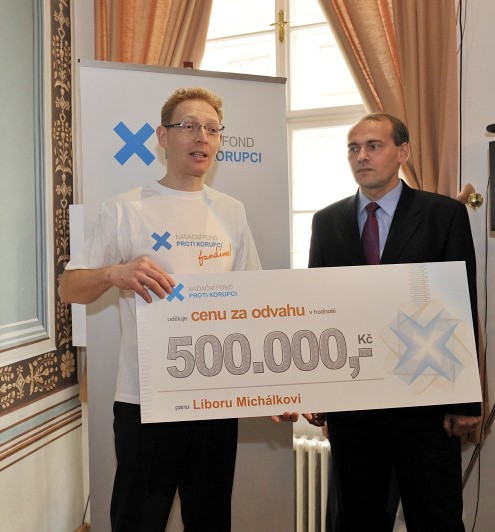 Michálek has remained true to his values and has not betrayed his vision of a world free of corruption. He is a man who believes that if we all stood in the line of whistleblowers when we came across criminal behavior, the world would have much less corruption, and citizens would live much better. Led by this idea, Michálek entered politics, where as an independent candidate he entered the Czech Parliament, and there in 2013 he proposed the first Czech Law on Protection of Whistleblowers.
Michálek has remained true to his values and has not betrayed his vision of a world free of corruption. He is a man who believes that if we all stood in the line of whistleblowers when we came across criminal behavior, the world would have much less corruption, and citizens would live much better. Led by this idea, Michálek entered politics, where as an independent candidate he entered the Czech Parliament, and there in 2013 he proposed the first Czech Law on Protection of Whistleblowers.In March 2011, Michálek was awarded first prize from the Endowment Fund Against Corruption for his whistleblowing. In May 2011, he was awarded the František Kriegel Prize by the Charter 77 Foundation for his "brave, consistent and uncompromising fight against corruption in government.".
Libor Michálek once said. “The problem of the world is not the power of the evil but the weakness of the good.”
7. Aubrey Blumsohn ("Ghostwriting” scandal, United Kingdom, 2006)
Aubrey Blumsohn is a British biochemist and former researcher at the University of Sheffield in the United Kingdom. He was part of a joint research project with Procter & Gamble about the company’s drug Actonel (risedronate) andwas prominence as a whistleblower in the early 2000s for ...
 Aubrey Blumsohn is a British biochemist and former researcher at the University of Sheffield in the United Kingdom. He was part of a joint research project with Procter & Gamble about the company’s drug Actonel (risedronate) andwas prominence as a whistleblower in the early 2000s for his exposure of data manipulation and research misconduct related to clinical trials and bone density research.
Aubrey Blumsohn is a British biochemist and former researcher at the University of Sheffield in the United Kingdom. He was part of a joint research project with Procter & Gamble about the company’s drug Actonel (risedronate) andwas prominence as a whistleblower in the early 2000s for his exposure of data manipulation and research misconduct related to clinical trials and bone density research.He was asked to publish in his own name academic papers prepared by a writer working on behalf of Procter & Gamble Pharmaceutical about the effects on patients of the anti-osteoporosis drug Actonel. Dr Blumsohn asked to see the raw data underlying the draft papers but P&G refused to provide them on grounds that they were proprietary information․Although he refused, P&G began ghost writing and publishing under Blumsohn's name research findings about Actonel․When he was finally permitted to do a limited review, he discovered that up to 40% of data essential for conclusions was missing, with the aim of covering the potential negative effects of the drug up. Finally, under public pressure, in June 2006 P&G released the missing data to Dr. Blumsohn. The results were unfavorable forP&G.
His efforts to expose the misconduct faced challenges and resistance, leading to disputes with the university․Blumsohn's case raised important questions about scientific integrity, transparency, and the responsibilities of researchers and institutions in ensuring the accuracy and reliability of research findings. It also shed light on the challenges whistleblowers often face when exposing research misconduct.
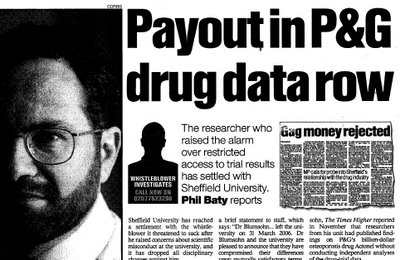 In November 2007 Procter and Gamble Pharmaceuticals admitted that results in one key publication had been distorted, and Sheffield University were criticized. Blumson left Sheffield University but has become one of the most important doctors discussing pharmaceutical research through his blog and speaking engagements.
In November 2007 Procter and Gamble Pharmaceuticals admitted that results in one key publication had been distorted, and Sheffield University were criticized. Blumson left Sheffield University but has become one of the most important doctors discussing pharmaceutical research through his blog and speaking engagements.Aubrey Blumsohn said. “Scientists since Galileo have realised you can’t be a scientist without data,”
8. Cheryl Eckard ("GlaxoSmithKline whistleblower" scandal, Puerto Rico, 2002)
`Cheryl Eckard is a former quality control manager for GlaxoSmithKline (GSK), a major pharmaceutical company. She gained prominence as a whistleblower in the mid-2000s for exposing serious manufacturing and quality control issues within GSK.
In August 2002, Eckard, a quality assurance manager, led ...
` Cheryl Eckard is a former quality control manager for GlaxoSmithKline (GSK), a major pharmaceutical company. She gained prominence as a whistleblower in the mid-2000s for exposing serious manufacturing and quality control issues within GSK.
Cheryl Eckard is a former quality control manager for GlaxoSmithKline (GSK), a major pharmaceutical company. She gained prominence as a whistleblower in the mid-2000s for exposing serious manufacturing and quality control issues within GSK.
 Cheryl Eckard is a former quality control manager for GlaxoSmithKline (GSK), a major pharmaceutical company. She gained prominence as a whistleblower in the mid-2000s for exposing serious manufacturing and quality control issues within GSK.
Cheryl Eckard is a former quality control manager for GlaxoSmithKline (GSK), a major pharmaceutical company. She gained prominence as a whistleblower in the mid-2000s for exposing serious manufacturing and quality control issues within GSK.In August 2002, Eckard, a quality assurance manager, led a team sent to the plant in Puerto Rico, where was made a range of products including an antibiotic ointment for babies, and drugs to treat nausea, depression and diabetes։
Eckard lost her job nine months later after warning that the problems ran deeper than the FDA realized. She reported her findings to GSK's management, urging them to address the deficiencies and bring the plant up to standard. When her concerns were not adequately addressed, she decided to escalate the matter to higher levels within the company. Ultimately, she felt that GSK was not taking appropriate action to correct the problems.
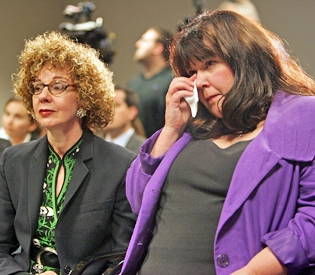 Eckard's lawyer said she was made redundant against her will, after repeatedly complaining to GSK's management that some drugs made at the company were being produced in a non-sterile environment, that the factory's water system was contaminated with micro-organisms, and that other medicines were being made in the wrong doses. "Cheryl Eckard is a role model for whistleblowers," said the lawyer.
Eckard's lawyer said she was made redundant against her will, after repeatedly complaining to GSK's management that some drugs made at the company were being produced in a non-sterile environment, that the factory's water system was contaminated with micro-organisms, and that other medicines were being made in the wrong doses. "Cheryl Eckard is a role model for whistleblowers," said the lawyer.In 2003, Eckard filed a whistleblower lawsuit against GSK under the False Claims Act. The lawsuit alleged that GSK had knowingly manufactured and distributed adulterated drugs and submitted false claims to government healthcare programs.
In 2010, GSK agreed to pay a $750 million settlement to resolve civil and criminal charges related to the manufacturing deficiencies and other issues raised by Cheryl Eckard and other whistleblowers.
Cheryl Eckard was awarded $96m (£60m). Her actions as a whistleblower helped shed light on critical issues related to pharmaceutical manufacturing, regulatory compliance, and the importance of maintaining high-quality standards in the pharmaceutical industry.
Cheryl Eckard said. “This is not something I ever wanted to do, but because of patient safety issues, it was necessary,”
9. Harry Markopolos (“Ponzi Scheme” scandal, USA, 2000s)
Harry Markopolos is indeed a well-known whistleblower. He gained significant attention for his early and persistent warnings about the investment firm Bernard L. Madoff Investment Securities LLC and its massive Ponzi scheme.
Harry Markopolos played a significant role in revealing the Bernard Madoff...
 Harry Markopolos is indeed a well-known whistleblower. He gained significant attention for his early and persistent warnings about the investment firm Bernard L. Madoff Investment Securities LLC and its massive Ponzi scheme.
Harry Markopolos is indeed a well-known whistleblower. He gained significant attention for his early and persistent warnings about the investment firm Bernard L. Madoff Investment Securities LLC and its massive Ponzi scheme.Harry Markopolos played a significant role in revealing the Bernard Madoff Ponzi scheme. He initially became suspicious of Madoff's reported investment returns and strategies while working for a rival firmas a financial analyst. He believed that Madoff's consistent high returns were not achievable through legitimate trading strategies.
Madoff, a respected Wall Street name, ran his illegal investment business for years under the guise of a legitimate trading strategy․Markopolos says: "I'm coming in saying there's a hedge fund you've never heard of that's six to 10 times larger than anything you know that exists and by the way, it's corrupt, it's secretive and it's run by someone you already know, Bernie Madoff."
He conducted an analysis of Madoff's purported investment performance and found that the reported returns were statistically improbable. Markopolos then submitted detailed reports to the U.S. Securities and Exchange Commission (SEC) outlining his concerns and providing evidence of the potential fraud.
 Over the years, Markopolos made several submissions to the SEC, providing extensive documentation and analysis to support his claims. Despite his efforts, the SEC did not take action for several years. Frustrated by the lack of response from regulatory agencies, Markopolos continued to publicize his findings through media interviews and public appearances. He quit his job to pursue fraud investigations full-time and later was presented with a silver whistle by Boston's Security Analysts Society.
Over the years, Markopolos made several submissions to the SEC, providing extensive documentation and analysis to support his claims. Despite his efforts, the SEC did not take action for several years. Frustrated by the lack of response from regulatory agencies, Markopolos continued to publicize his findings through media interviews and public appearances. He quit his job to pursue fraud investigations full-time and later was presented with a silver whistle by Boston's Security Analysts Society.The Madoff Ponzi scheme was eventually exposed in December 2008 when Bernard Madoff was arrested and admitted to operating the fraudulent scheme. The revelations sent shockwaves through the financial world, and it became clear that Markopolos had been right in his suspicions all along. His persistence and determination to expose the truth were instrumental in bringing the Ponzi scheme to light.
Harry Markopolos once said. “Every mathematician loves the hunt for the sour numbers in an equation.”
10. Michael Woodford (“Olympus” scandal, Japan, 2011)
Michael Woodford is a British businessman and former President and CEO of Olympus Corporation, a Japanese multinational company. He is renowned for his role as a whistleblower in exposing a massive accounting scandal at Olympus in 2011.
Woodford began his career at Olympus and gradually rose t...
 Michael Woodford is a British businessman and former President and CEO of Olympus Corporation, a Japanese multinational company. He is renowned for his role as a whistleblower in exposing a massive accounting scandal at Olympus in 2011.
Michael Woodford is a British businessman and former President and CEO of Olympus Corporation, a Japanese multinational company. He is renowned for his role as a whistleblower in exposing a massive accounting scandal at Olympus in 2011.Woodford began his career at Olympus and gradually rose through the ranks, ultimately becoming the CEO of the company in April 2011. However, within weeks of taking on the role, he started receiving information and reports suggesting financial misconduct within the company, specifically concerning significant losses and suspicious acquisitions.
Concerned about these potential irregularities, Woodford initiated an internal investigation, which uncovered a massive accounting fraud dating back several years, involving complex financial schemes designed to hide losses totaling over $1.7 billion.
On October 14, 2011, Woodford was abruptly dismissed from his position as CEO, purportedly due to "management style" differences. Suspecting that his termination was linked to his investigations into the financial irregularities, he decided to blow the whistle on the fraudulent activities at Olympus.
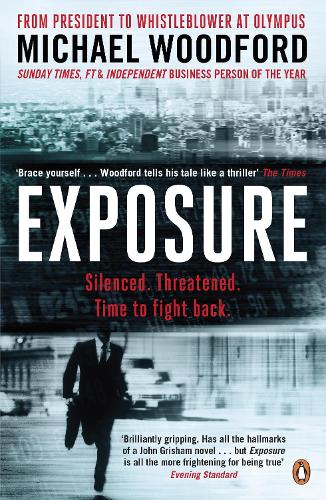 As a whistleblower, Michael Woodford played a crucial role in exposing the Olympus scandal and promoting transparency and accountability within the corporate world. Woodford exposed the findings of the internal investigation to international media, regulators, and law enforcement agencies. His courage and determination led to a significant decline in Olympus's stock price and a public outcry. It also triggered investigations by various authorities, including Japanese law enforcement agencies.
As a whistleblower, Michael Woodford played a crucial role in exposing the Olympus scandal and promoting transparency and accountability within the corporate world. Woodford exposed the findings of the internal investigation to international media, regulators, and law enforcement agencies. His courage and determination led to a significant decline in Olympus's stock price and a public outcry. It also triggered investigations by various authorities, including Japanese law enforcement agencies.Woodford now consults on corporate governance worldwide, speaks on human rights, whistleblower laws. He also undertakes philanthropy, and has stated he has given several millions of pounds to charities. He also documented his experiences and the Olympus scandal in a book titled "Exposure: Inside the Olympus Scandal: How I Went from CEO to Whistleblower". In the book, he detailed the events leading up to his dismissal, the internal investigation, and the aftermath of his whistleblowing.
Michael Woodford said. "There is a disaster in Japan because of these social characteristics – the deference, not being able to question people in authority,"
11. Cynthia Cooper (“WorldCom” scandal, USA, 2002)
Cynthia Cooper is a notable whistleblower recognized for her role in exposing accounting irregularities and a major financial scandal at WorldCom, one of the largest telecommunications companies in the United States during the early 2000s.
As the Vice President of Internal Audit at WorldCom, Cynthi...
 Cynthia Cooper is a notable whistleblower recognized for her role in exposing accounting irregularities and a major financial scandal at WorldCom, one of the largest telecommunications companies in the United States during the early 2000s.
Cynthia Cooper is a notable whistleblower recognized for her role in exposing accounting irregularities and a major financial scandal at WorldCom, one of the largest telecommunications companies in the United States during the early 2000s.As the Vice President of Internal Audit at WorldCom, Cynthia Cooper and her team discovered significant financial discrepancies in the company's accounting practices. With her team of auditors, she unearthed $3.8 billion of fraudulent entries. Cooper and her team then questioned company accountants, some of whom revealed that they were instructed to make entries without seeing support for them by the Corporate Controller and the General Accounting Director. After finding more suspicious entries, Cooper’s team asked KPMG to conduct a review, which confirmed that the company was fraudulently moving capital across accounts. In light of these findings, the WorldCom board demanded that the controller and the accounting director resign.
On June 25, 2002, WorldCom publicly admitted it had overstated its income by $3.8 billion, which was then the largest instance of accounting fraud in US history. The story ofWorldCom’s fraud broke in major media outlets including The Wall Street Journal, The Guardian, The New York Times, The Washington Post, and others.
The company could no longer keep up once things started to unravel. Bankruptcy was the only option. WorldCom filed for bankruptcy. The company was indebted to its creditors by as much as $7.7 billion․
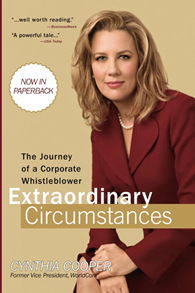 Cynthia Cooper, along with her team, received recognition and awards for their courage and determination in exposing the scandal. Time magazine named her as one of its Persons of the Year in 2002, recognizing the impact of her actions. Her actions as a whistleblower were instrumental in bringing the fraudulent activities at WorldCom to light and initiating a process of accountability and reform. She also documented her experiences and the WorldCom scandal in her memoir titled “Extraordinary Circumstances: The Journey of a Corporate Whistleblower”.
Cynthia Cooper, along with her team, received recognition and awards for their courage and determination in exposing the scandal. Time magazine named her as one of its Persons of the Year in 2002, recognizing the impact of her actions. Her actions as a whistleblower were instrumental in bringing the fraudulent activities at WorldCom to light and initiating a process of accountability and reform. She also documented her experiences and the WorldCom scandal in her memoir titled “Extraordinary Circumstances: The Journey of a Corporate Whistleblower”.Cynthia Cooper once said. “It’s so important to share this story with the next generation of leaders. We want to make sure the moral fabric of our country is strong and that this kind of thing doesn’t happen again.”
12. John Githongo (“Anglo-Leasing” scandal, Kenya, 2000s)
John Githongo is a Kenyan anti-corruption campaigner and whistleblower known for his efforts in exposing corruption at the highest levels of the Kenyan government.
In 2003, John Githongo was appointed as the Permanent Secretary for Governance and Ethics in Kenya under President Mwai Kibaki's admini...
 John Githongo is a Kenyan anti-corruption campaigner and whistleblower known for his efforts in exposing corruption at the highest levels of the Kenyan government.
John Githongo is a Kenyan anti-corruption campaigner and whistleblower known for his efforts in exposing corruption at the highest levels of the Kenyan government.In 2003, John Githongo was appointed as the Permanent Secretary for Governance and Ethics in Kenya under President Mwai Kibaki's administration. In this role, he was tasked with tackling corruption and promoting good governance. However, he found evidence of a massive corruption scheme known as the Anglo Leasing scandal, involving inflated government contracts for security-related projects.
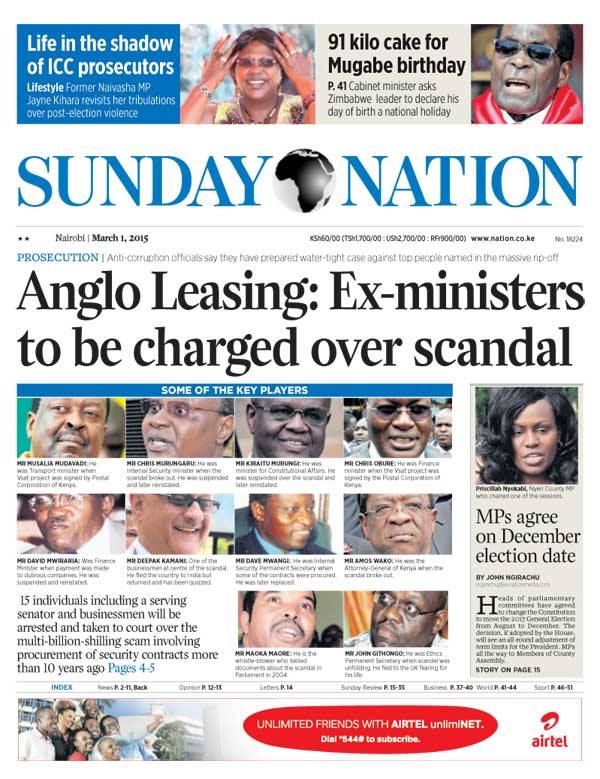 Githongo began investigating and gathering evidence related to the scandal. In 2006, Githongo made a publication on the Anglo-leasing report which refers to 18 contracts signed between the Kenyan government and several domestic and foreign companies for security equipment and services totalling $770m. Thirteen contracts were initiated in the late 1990s under the presidency of Daniel arap Moi and five more were made during the presidency of Mwai Kibaki, elected in 2002. As the contracts were for security equipment, ranging from tamper-proof passports and forensic laboratories, to helicopters and satellite services, the awards were made without resorting to open public tender. The deals relied on complicated financing arrangements. The true identities and whereabouts of the companies remained unclear. Even after a parliamentary committee branded the contracts “a scam” in 2006, several of the companies continued to file court cases against the government requiring them to pay up.
Githongo began investigating and gathering evidence related to the scandal. In 2006, Githongo made a publication on the Anglo-leasing report which refers to 18 contracts signed between the Kenyan government and several domestic and foreign companies for security equipment and services totalling $770m. Thirteen contracts were initiated in the late 1990s under the presidency of Daniel arap Moi and five more were made during the presidency of Mwai Kibaki, elected in 2002. As the contracts were for security equipment, ranging from tamper-proof passports and forensic laboratories, to helicopters and satellite services, the awards were made without resorting to open public tender. The deals relied on complicated financing arrangements. The true identities and whereabouts of the companies remained unclear. Even after a parliamentary committee branded the contracts “a scam” in 2006, several of the companies continued to file court cases against the government requiring them to pay up.Faced with threats to his life, Githongo went to exile in the United Kingdom (UK). He returned to Kenya in 2008, and founded a non-governmental organization that promotes good governance in Kenya named Inuka Kenya Trust.
In January 2011, he launched a new campaign, Kenya Ni Yetu (Kenya is Ours), aimed at mobilizing ordinary people to speak up against corruption, impunity and injustice. Then he shared the evidence he had collected with international organizations and the media, bringing attention to the pervasive corruption in Kenya.
His actions were instrumental in exposing corruption and kickstarting investigations and reforms within the Kenyan government.
John Githongo said. “Corruption is ultimately causing poverty. It's poisoning our politics. It's increasing the level of violence in our politics”.
13. Jeffrey Wigand (“Tobacco industry’s scandal”, USA, 1990s)
Jeffrey Wigand is a former tobacco industry executive who became a famous whistleblower in the 1990s. He played a crucial role in exposing the tobacco industry's practices related to concealing the health risks associated with smoking and the manipulation of nicotine levels in cigarettes.
Wigand wa...
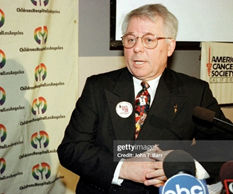 Jeffrey Wigand is a former tobacco industry executive who became a famous whistleblower in the 1990s. He played a crucial role in exposing the tobacco industry's practices related to concealing the health risks associated with smoking and the manipulation of nicotine levels in cigarettes.
Jeffrey Wigand is a former tobacco industry executive who became a famous whistleblower in the 1990s. He played a crucial role in exposing the tobacco industry's practices related to concealing the health risks associated with smoking and the manipulation of nicotine levels in cigarettes.Wigand was a biochemist and a vice-president of research and development at Brown & Williamson (B&W). Wigand's job was to research safer ways to deliver nicotine by reducing the harm of other chemical compounds in cigarettes, but his research and recommendations were continuously ignored because they might negatively impact sales. His research also involved improving chemicals used for enhancing nicotine absorption so it would affect the brain and nervous system faster. Wigand believed that this was a deliberate attempt to increase addiction to cigarettes. At the time, executives at Big Tobacco companies knew that nicotine was addictive and that smoking was a health hazard, but they kept this secret from the general public, even lying in congressional hearings.
Wigand was fired after arguing with the B&W CEO about a tobacco additive called "Coumarin"[1], which B&W continued to use as a flavor enhancer even though Wigand believed it to be carcinogenic and "a form of rat poison". He was forced to sign a strict confidentiality agreement which prohibited him from saying anything related to his work or the company.
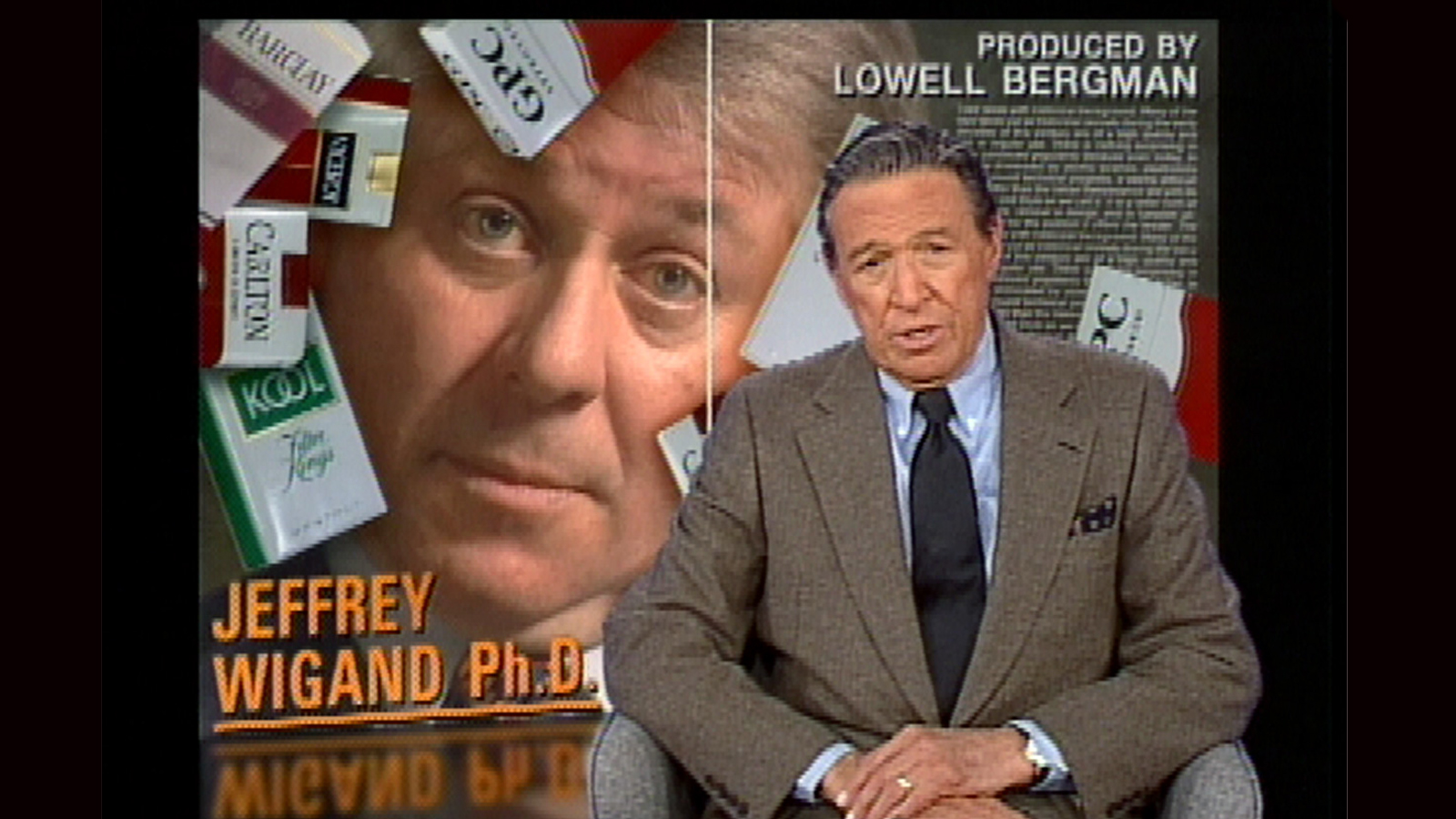 Wigand was wary of breaking his confidentiality agreement, and initially refused to talk. But Lowell Bergman, a producer for 60 Minutes on CBS News, convinced him to do a 60 Minutes interview and to testify for the State of Mississippi in a lawsuit against Big Tobacco seeking reimbursement for the healthcare costs of treating smoking-related illnesses. But CBS lawyers were nervous about B&W threatening to sue them, and at first only aired an edited version of Wigand's interview that left out the critical details. B&W still tried to sue Wigand after the edited interview was released.
Wigand was wary of breaking his confidentiality agreement, and initially refused to talk. But Lowell Bergman, a producer for 60 Minutes on CBS News, convinced him to do a 60 Minutes interview and to testify for the State of Mississippi in a lawsuit against Big Tobacco seeking reimbursement for the healthcare costs of treating smoking-related illnesses. But CBS lawyers were nervous about B&W threatening to sue them, and at first only aired an edited version of Wigand's interview that left out the critical details. B&W still tried to sue Wigand after the edited interview was released.CBS ultimately released his complete, unedited interview, which an executive producer later called "the most important story that was ever reported by 60 Minutes." In 1998, cigarette companies agreed to pay a $368 billion settlement to the federal government.
Jeffrey Wigand once said. “The word whistleblower suggests that you’re a tattletale or that you’re somehow disloyal. But I wasn’t disloyal in the least bit. People were dying. I was loyal to a higher order of ethical responsibility”.
14. Howard Wilkinson ("Danske Bank money" laundering scandal, Estonia, 2017)
Howard Wilkinson is a British former employee of Danske Bank, a major Danish financial institution. He is a central figure in the Danske Bank money laundering scandal, one of Europe's largest money laundering cases in recent years.
In 2013, Wilkinson noticed suspicious activity in Danske Bank&rsquo...
 Howard Wilkinson is a British former employee of Danske Bank, a major Danish financial institution. He is a central figure in the Danske Bank money laundering scandal, one of Europe's largest money laundering cases in recent years.
Howard Wilkinson is a British former employee of Danske Bank, a major Danish financial institution. He is a central figure in the Danske Bank money laundering scandal, one of Europe's largest money laundering cases in recent years.In 2013, Wilkinson noticed suspicious activity in Danske Bank’s records. When he investigated further, he found a $234 billion laundering scheme. The money allegedly came from Russia and other post-Soviet countries to Estonia and then flowed to high-profile European and American banks. Wilkinson repeatedly reported his concerns internally before resigning in 2014.
In February of 2014, Estonian inspectors entered the Estonia bank and took thousands of documents. The inspectors sent a blistering report to the Danske Bank in Copenhagen, noting many banking law violations. An internal audit team sent by Danske Bank determined that the Estonian branch had not identified the real source of funds in many accounts.
The information provided by Howard Wilkinson ultimately led to the exposure of a massive money laundering operation, involving approximately €200 billion in suspicious transactions, flowing through Danske Bank's Estonian branch between 2007 and 2015.
 In 2020, Howard Wilkinson awarded Allard Priz which was launched in 2012 to honor the contributions of individuals, movements, and organizations in the fight against corruption and the protection of human rights. It is awarded biennially and is one of the world's largest anti-corruption prizes at $100,000.
In 2020, Howard Wilkinson awarded Allard Priz which was launched in 2012 to honor the contributions of individuals, movements, and organizations in the fight against corruption and the protection of human rights. It is awarded biennially and is one of the world's largest anti-corruption prizes at $100,000.Wilkinson's decision to blow the whistle and cooperate with authorities played a pivotal role in uncovering the scandal. His actions highlighted the importance of whistleblowers in exposing financial misconduct and promoting transparency and accountability within the banking and financial sector.
Howard Wilkinson said. “As citizens, we entrust our government, our police and prosecutors, even our banks and their regulators with the responsibility to dissuade, identify and prosecute money laundering and other crime. But we don’t abrogate all responsibility; sometimes, as citizens, we have to do our part too. That’s what I see myself as having done, which was clearly the right thing to do in the circumstances.”
15. Joe Darby («Abu Ghraib» scandal, Iraq, 2004)
Joe Darby is known for his role as a whistleblower in the Abu Ghraib torture and prisoner abuse scandal. He was a member of the U.S. military, serving as a reservist in the United States Army.
In January 2004, Darby discovered disturbing images that depicted the mistreatment of prisoners by U.S. so...
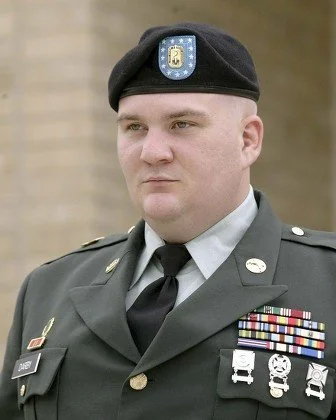 Joe Darby is known for his role as a whistleblower in the Abu Ghraib torture and prisoner abuse scandal. He was a member of the U.S. military, serving as a reservist in the United States Army.
Joe Darby is known for his role as a whistleblower in the Abu Ghraib torture and prisoner abuse scandal. He was a member of the U.S. military, serving as a reservist in the United States Army.In January 2004, Darby discovered disturbing images that depicted the mistreatment of prisoners by U.S. soldiers. Upon discovering the photographs, Darby reported the abuse to military investigators. He recognized the severity and wrongfulness of the actions depicted in the images and felt a moral obligation to expose the misconduct. He handed over a CD containing the photographs to the authorities, initiating an internal investigation into the incidents.
 The images and the subsequent investigation triggered a significant scandal and international outrage when they were made public by media outlets, including CBS News, in April 2004. The exposure of the abuse at Abu Ghraib prison shed light on the mistreatment of detainees and raised serious concerns about the conduct of U.S. forces during the Iraq War.
The images and the subsequent investigation triggered a significant scandal and international outrage when they were made public by media outlets, including CBS News, in April 2004. The exposure of the abuse at Abu Ghraib prison shed light on the mistreatment of detainees and raised serious concerns about the conduct of U.S. forces during the Iraq War.The scandal had far-reaching implications, tarnishing the reputation of the U.S. military and raising concerns about the treatment of detainees during the Iraq War.
In 2005 Darby has been awarded a Special John F. Kennedy Profile in Courage Award.
Joe Darby said. "We're Americans, we're not Saddam. We hold ourselves to a higher standard. Our soldiers hold themselves to a higher standard."
16. Bradley Birkenfeld ("Birkenfeld Disclosure" scandal, Switzerland, 2005)
Bradley Birkenfeld is the most significant financial whistleblower in history. He is known for exposing widespread tax evasion facilitated by the Swiss banking giant UBS. He worked as a private banker for UBS in Switzerland[1] and was instrumental in revealing the bank's assistance to wealthy client...
 Bradley Birkenfeld is the most significant financial whistleblower in history. He is known for exposing widespread tax evasion facilitated by the Swiss banking giant UBS. He worked as a private banker for UBS in Switzerland[1] and was instrumental in revealing the bank's assistance to wealthy clients in evading taxes through offshore accounts.
Bradley Birkenfeld is the most significant financial whistleblower in history. He is known for exposing widespread tax evasion facilitated by the Swiss banking giant UBS. He worked as a private banker for UBS in Switzerland[1] and was instrumental in revealing the bank's assistance to wealthy clients in evading taxes through offshore accounts.As an international private banker, he exposed how UBS, the world’s largest bank, helped ultra-wealthy Americans commit billions in tax fraud. His bombshell revelations cracked the impenetrable fortress of Swiss banks, proving that offshore financial institutions systematically aided clients’ tax evasion, corruption and terrorist activities. His case triggered monumental changes in banking laws, the federal tax code and international tax treaties.
In 2005, despite a thriving career spanning UBS, Birkenfeld could no longer keep silent about bank-enabled tax fraud. When UBS rejected his concerns, he turned to the U.S. authorities. Though jailed for 30 months, he was soon vindicated with a record-breaking IRS reward: his work had enabled the U.S. Treasury to recover $25 billion in back taxes, fines and penalties. The case set off a domino effect of international investigations into offshore banking’s secret crimes, including the Panama Papers and much more.
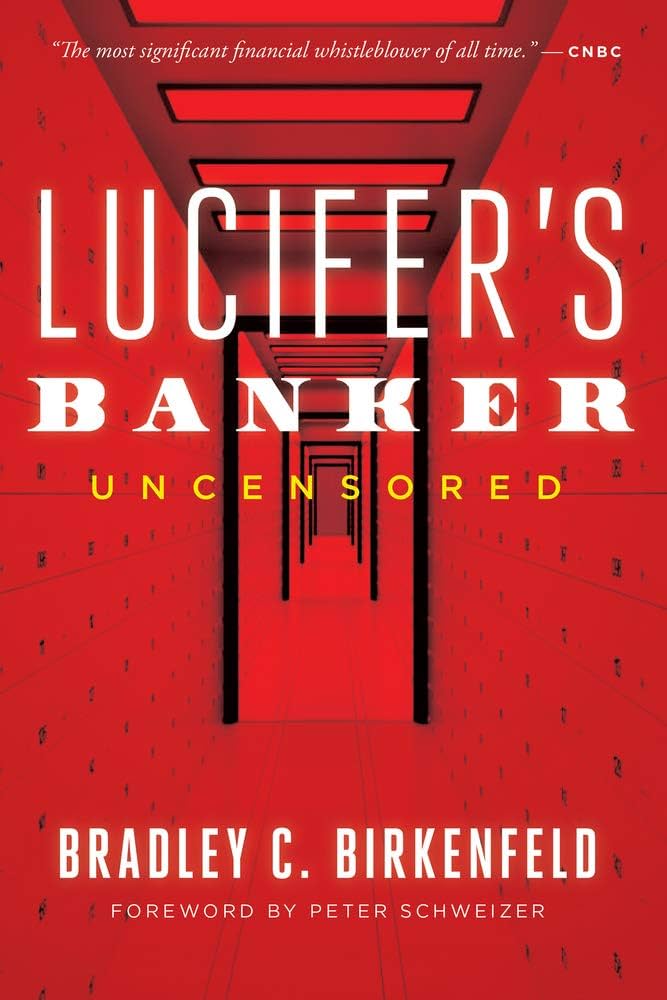 As a whistleblower, Bradley Birkenfeld received a substantial reward for his role in exposing the tax evasion scheme. In 2012, Birkenfeld received a record-breaking whistleblower award of $104 million from the U.S. government.
As a whistleblower, Bradley Birkenfeld received a substantial reward for his role in exposing the tax evasion scheme. In 2012, Birkenfeld received a record-breaking whistleblower award of $104 million from the U.S. government.in 2016, Bradley Birkenfeld published a book titled "Lucifer's Banker: The Untold Story of How I Destroyed Swiss Bank Secrecy." The book provides an insider's account of his experiences working in the banking industry and his role as a whistleblower in exposing tax evasion at UBS. In "Lucifer's Banker," Birkenfeld details the intricate workings of UBS and sheds light on the pervasive tax evasion practices he witnessed.
Bradley Birkenfeld said։"I took on the biggest bank in the world and brought them down, and I took on the biggest government in the world and exposed their corruption, and I'm being rewarded with jail․ I would do it again."
17. Mark Felt (“Watergate scandal”, USA, 1970s)
Mark Felt, also known as "Deep Throat," was a high-ranking FBI official who became a prominent whistleblower during the Watergate scandal in the 1970s. Felt was the deputy director of the FBI at the time and played a critical role in exposing the illegal activities of the Nixon administration.
On J...
 Mark Felt, also known as "Deep Throat," was a high-ranking FBI official who became a prominent whistleblower during the Watergate scandal in the 1970s. Felt was the deputy director of the FBI at the time and played a critical role in exposing the illegal activities of the Nixon administration.
Mark Felt, also known as "Deep Throat," was a high-ranking FBI official who became a prominent whistleblower during the Watergate scandal in the 1970s. Felt was the deputy director of the FBI at the time and played a critical role in exposing the illegal activities of the Nixon administration.On June 17, 1972, five men were arrested for breaking into Democratic National Committee headquarters. As second in command, Felt was asked to head the bureau's investigation into the break-in to determine the datails. On June 19, 1972, Washington Post journalists Bob Woodward and Carl Bernstein received information from a high-level government official who was given the moniker "Deep Throat."
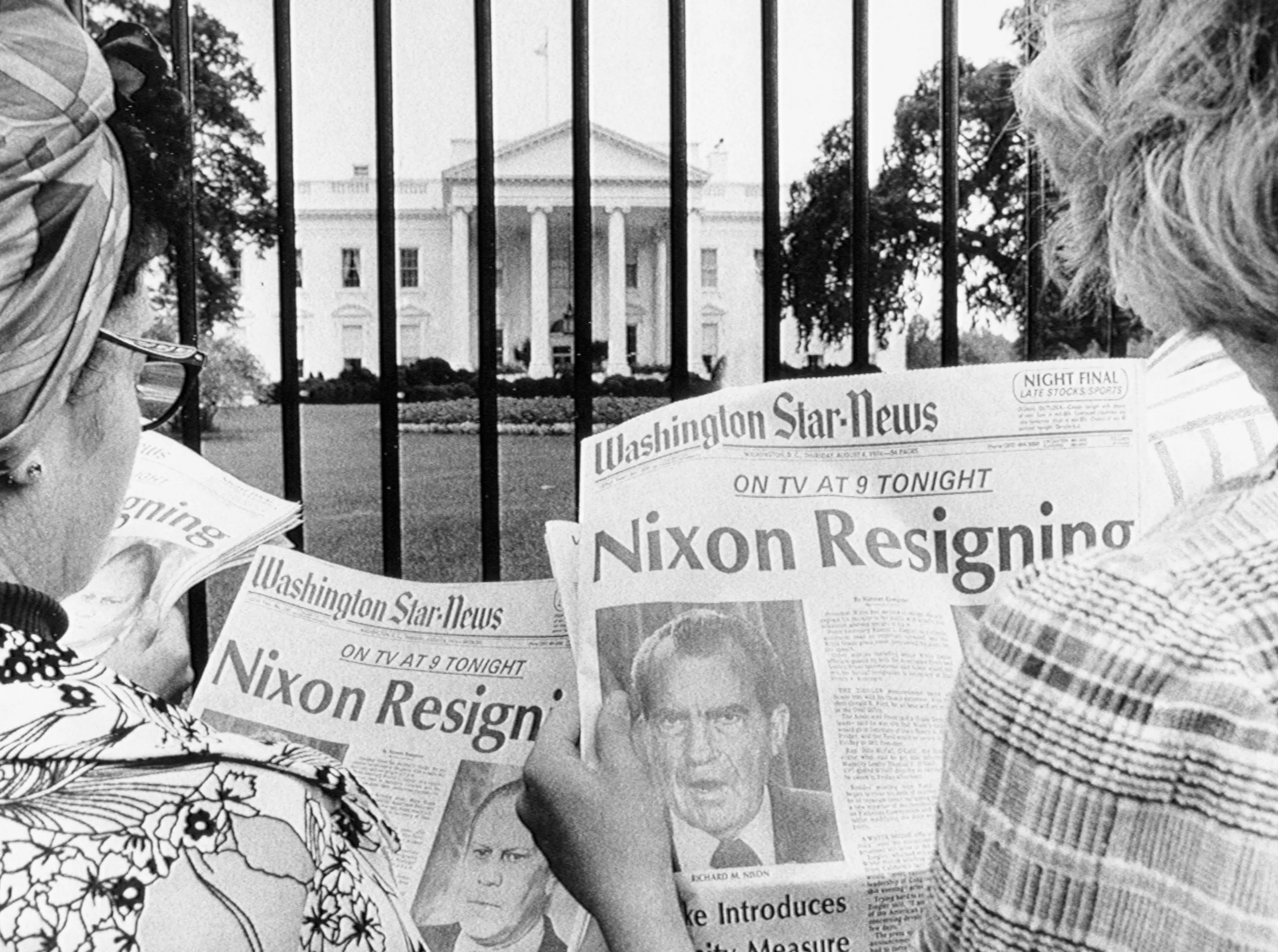 During the phone call, Deep Throat told the journalists that former CIA agent and Nixon staff member Howard Hunt was definitely involved in the Watergate scandal. The hot tip gave journalists enough leverage to call for a widespread investigation of the White House's activities, which significantly sped up what would have otherwise become a slow and lengthy trial. The trials in 1973 revealed a string of criminal acts involving campaign fraud, political espionage, breaking and entering and illegal wiretapping that all led back to President Nixon and his staff. The evidence eventually led to Nixon’s resignation on August 9, 1974. Yet even after the trial, the identity of the man known as Deep Throat remained a mystery.
During the phone call, Deep Throat told the journalists that former CIA agent and Nixon staff member Howard Hunt was definitely involved in the Watergate scandal. The hot tip gave journalists enough leverage to call for a widespread investigation of the White House's activities, which significantly sped up what would have otherwise become a slow and lengthy trial. The trials in 1973 revealed a string of criminal acts involving campaign fraud, political espionage, breaking and entering and illegal wiretapping that all led back to President Nixon and his staff. The evidence eventually led to Nixon’s resignation on August 9, 1974. Yet even after the trial, the identity of the man known as Deep Throat remained a mystery.Felt retired from the FBI on June 22, 1973. Decades later, after he suffered a stroke and encountered serious illness, his daughter, Joan, persuaded him to go public.
On May 31, 2005, he broke his silence in an issue of Vanity Fair. The article revealed Felt's identity as Deep Throat, and Woodward and Bernstein later confirmed this to be fact. On December 18, 2008, Felt died in his sleep after suffering from congestive heart failure.
Mark Felt said. “I think this is justified and I'd do it again tomorrow”
18. Chelsea Manning (“Wikileaks scandal”, USA/Iraq, 2010)
Chelsea Manning is a former United States Army intelligence analyst who gained significant attention for disclosing classified documents to WikiLeaks[1] in 2010.
In early 2010, while stationed in Iraq, Manning began leaking classified information, including diplomatic cables and military documents,...
 Chelsea Manning is a former United States Army intelligence analyst who gained significant attention for disclosing classified documents to WikiLeaks[1] in 2010.
Chelsea Manning is a former United States Army intelligence analyst who gained significant attention for disclosing classified documents to WikiLeaks[1] in 2010.In early 2010, while stationed in Iraq, Manning began leaking classified information, including diplomatic cables and military documents, to WikiLeaks that publishes classified and sensitive information. The leaks provided insights into military actions in Iraq and Afghanistan, as well as diplomatic communications. It also included a 2007 video in which a U.S. military crew aboard an Army Apache helicopter is shown shooting at Iraqi civilians and a Reuters journalist, after allegedly mistaking them for insurgents.
Manning says that when she joined the military, she was committed to the Army's mission. But she became disillusioned while serving in Iraq, and regards her decision to leak classified documents as a matter of principle. “What was bothering me was I [had] years of training and years of believing in something and then hitting the ground and then seeing it and feeling completely unprepared for how different [it was],” Manning says. “I wanted that discrepancy to be addressed somehow”.
Manning expected to lose her job and maybe her career because of the leaks. Instead, in 2013, she was sentenced to 35 years in prison in a military court-martial — a sentence President Obama later commuted to about seven years. She was imprisoned again in 2019 on a civil contempt charge for refusing to testify in a grand jury investigation of WikiLeaks, but was released the following year.
In 2017, President Barack Obama commuted Manning's sentence, and she was released from prison after serving about seven years. Manning has since become an advocate for transparency and government accountability, speaking out on various issues related to freedom of information and civil liberties.
Chelsea Manning once said. “I regret if my actions hurt anyone or harmed the United States. It was never my intent to hurt anyone. When I chose to disclose classified information, I did so out of a love for my country and a sense of duty to others.”